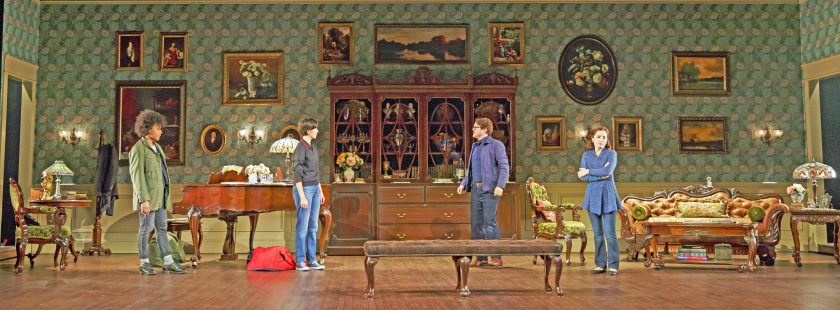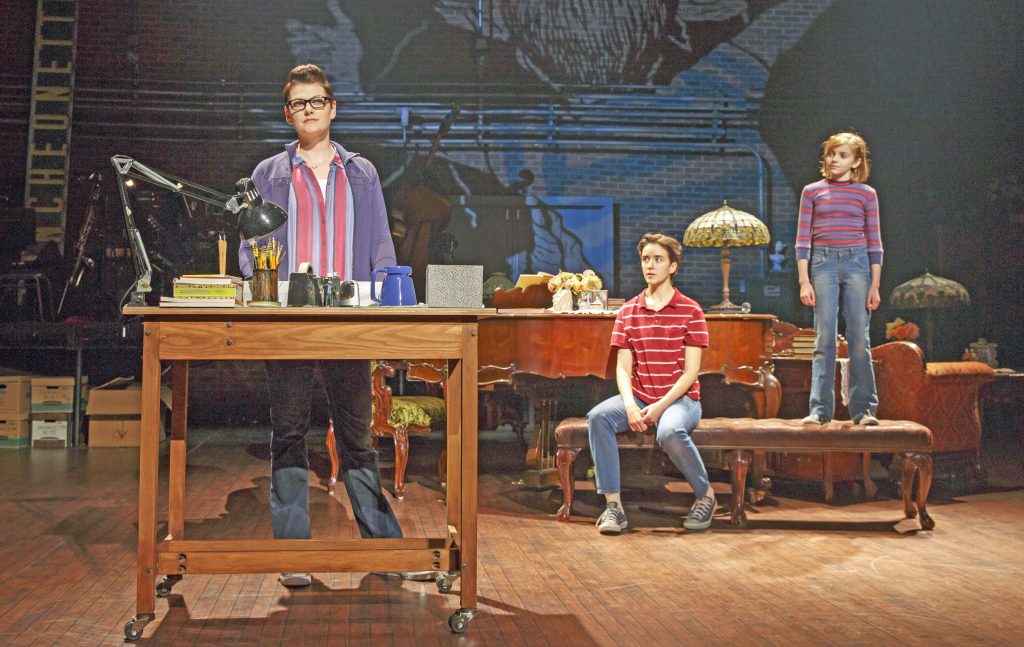
Fun Home. Music by Jeanine Tesori, lyrics by Lisa Kron. National tour, Spring and Summer 2017.
Fun Home doesn’t attempt to be a fun experience. The musical is a serious play involving a suicide. Playwright Lisa Kron recognized the need for some leavening, however, and her script includes considerable wit. As Kron wrote about another work of hers, “Humor and horror are juxtaposed.”
This national touring production exposes that duality more effectively than the award-winning Broadway show. In particular, Abby Corrigan as the college-age protagonist Medium Alison, employs a lighter touch than her New York predecessor. Kate Shindle, as the mature Alison, also takes a less fierce, less intimidating approach to her role, all with the guidance of the original director, Sam Gold.
An even more obvious difference between this road production and Broadway is the staging. At Circle in the Square in New York the show was in a small oval area surrounded by the audience. We felt as if we were in the same room with the family. That intimacy isn’t possible on proscenium stages on a national tour. But, to my delight, the action still seems close by. Designer David Zinn even made a nice addition when he filled the stage with the detailed interior of the home that the father had carefully restored and decorated, where “Everything is balanced and serene” as the lyric says. (See photo above.)
My earlier mention of suicide is not a spoiler. The outcome is revealed in the opening scene when the adult Alison sings about her father: “He was gay. And I was gay. And he killed himself. And I became a lesbian cartoonist.” Despite the lack of surprise, the drama grips us with its portrayal of a dysfunctional family where the father insisted that everyone follow his rules while he betrayed his wife with lovers.
This is based on the autobiographical illustrated novel by Alison Bechdel. A 43-year-old cartoonist looks back on her upbringing and seeks links between her father’s life and hers. Alison is represented by three actresses, characterizing three ages in the narrator’s life, sometimes appearing simultaneously. Shindle is sympathetic as the older Alison, Corrigan is captivating as the teenager, and Carly Gold is exuberant as the child. Robert Petkoff excells in the difficult role of the repressed father who insisted on order and control. Susan Moniz sings well in the smaller role of the mother.
Jeanine Tesori’s score is a beautiful blending of tenderness and humor. It’s a culmination of a career that has progressed from Violet through Caroline or Change, and now to this high point. She used oboe and clarinet in pairings with violin, viola and cello to express the feelings of the characters. And she balanced introspective, serious songs with comic numbers like the children’s commercial for their family’s funeral home, “Come to the Fun Home,” composed in the style of the Jackson Five. Micah Young led the seven-person band (same size as on Broadway) in the lovely orchestrations by John Clancy.
There’s humor in any giddy exclamation of first love, regardless of gender or sexual orientation. The teenage Alison in the Broadway production sang “I’m Changing My Major to Joan” with grave seriousness. I prefer the gentle wit that’s used by Corrigan.
Controversy was aroused by this production. A blogger called Sinister Woman, who identifies herself as a 19-year-old lesbian, angrily wrote that the central character has been “de-butched.” She complained that Kate Shindle’s haircut and clothing are different than her Broadway predecessor, writing: “The character is no longer really butch at all. It is no longer an accurate portrayal of Alison Bechdel or butch lesbians. Many lesbian fans of Bechdel’s writing and the show feel hurt, betrayed, and misrepresented.” Her protest was repeated online by many followers.
I see both sides of this argument. On the one hand, this is the memoir of a specific individual who makes a point of identifying herself as butch. Although lesbians have differing individual tastes in clothing, Bechdel favors a specific wardrobe which, to some of her fans, allows for no variations. Numerous butch women identify with her and want to see her image duplicated in every detail. And to many lesbians, butch denotes strength.
On the other hand, this is a theatrical creation with music and dancing; it is not a documentary, therefore the character doesn’t need to be an exact replica. In any event, Shindle as Alison does appear relatively butch. Lisa Kron says the small changes in costume and hair for the touring cast were entirely her idea and she had no intention of denigrating butch lesbians because “I’m married to one.”
Ben Brantley wrote that Fun Home is “the place where we all grew up, and will never be able to leave.” Well, no, most of us didn’t have a controlling, deceitful parent, and his comment burdens this play with an unnecessary heavy weight. Fun Home does grip all of us with its saga of a sometimes melancholy, occasionally exuberant family.
Below, the three Alisons:
